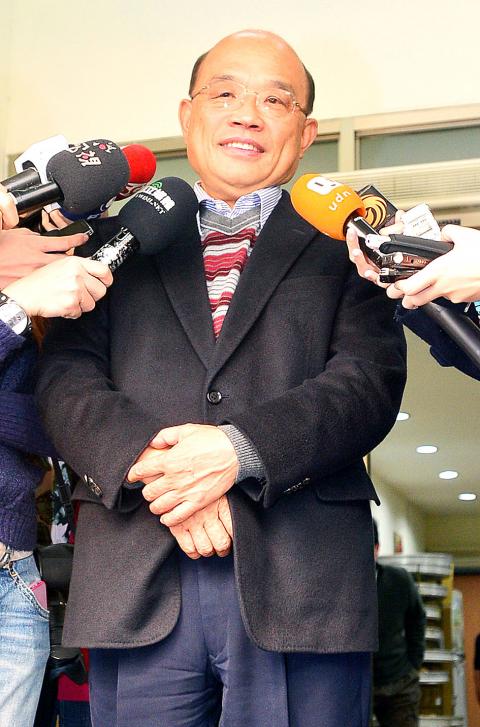The Central Election Commission (CEC) yesterday announced its final decision to combine the presidential and legislative elections next year, to save money and increase voter turnout.
“CEC members decided during a meeting today that the 14th presidential and the 9th legislative elections [next year] shall be held on the same day,” CEC Chairman Liu I-chou (劉義周) told a press conference after the meeting. “As for the date of the elections, the CEC will call a meeting with local election commissions to decide.”
Although a date has not been set, the elections are likely to be held in January next year, before the start of a new legislative session the following month.

Photo: Wang Yi-sung, Taipei Times
Liu said that according to three public hearings and an opinion poll, most people support combining the elections.
“Holding the two elections on the same day can help save money and social resources by avoiding repeated large-scale political mobilizations within a short time,” he said. “Moreover, compared with the 2008 presidential and legislative elections — which were held separately — the number of voters in the 2012 combined elections rose by about 3.3 million.”
Liu said the decision was also made to ensure policy continuity, since the 2012 presidential and legislative elections were held on the same day, as were last year’s nine-in-one elections.
Liu said concerns raised by Chinese Nationalist Party (KMT) Chairman Eric Chu (朱立倫) over the large gap between the elections in January and the presidential inauguration on May 20 would not be a problem.
“The nation has its own laws and systems to deal with the issue,” Liu said. “Besides, there would also be an empty period if the presidential election is postponed.”
Democratic Progressive Party (DPP) Legislator Wu Ping-jui (吳秉叡) welcomed the decision, saying that combined elections might save the nation up to NT$500 million (US$15 million).
Meanwhile, DPP spokesperson Cheng Yun-peng (鄭運鵬) urged the commission to draft laws and regulations to institutionalize combined legislative and presidential elections to avoid more debates on the issue.
KMT Legislator Lai Shyh-bao (賴士葆) said he respected the commission’s decision, adding that he did not think the change would make much difference to the party.

CHAOS: Iranians took to the streets playing celebratory music after reports of Khamenei’s death on Saturday, while mourners also gathered in Tehran yesterday Iranian Supreme Leader Ayatollah Ali Khamenei was killed in a major attack on Iran launched by Israel and the US, throwing the future of the Islamic republic into doubt and raising the risk of regional instability. Iranian state television and the state-run IRNA news agency announced the 86-year-old’s death early yesterday. US President Donald Trump said it gave Iranians their “greatest chance” to “take back” their country. The announcements came after a joint US and Israeli aerial bombardment that targeted Iranian military and governmental sites. Trump said the “heavy and pinpoint bombing” would continue through the week or as long

TRUST: The KMT said it respected the US’ timing and considerations, and hoped it would continue to honor its commitments to helping Taiwan bolster its defenses and deterrence US President Donald Trump is delaying a multibillion-dollar arms sale to Taiwan to ensure his visit to Beijing is successful, a New York Times report said. The weapons sales package has stalled in the US Department of State, the report said, citing US officials it did not identify. The White House has told agencies not to push forward ahead of Trump’s meeting with Chinese President Xi Jinping (習近平), it said. The two last month held a phone call to discuss trade and geopolitical flashpoints ahead of the summit. Xi raised the Taiwan issue and urged the US to handle arms sales to

State-run CPC Corp, Taiwan (CPC, 台灣中油) yesterday said that it had confirmed on Saturday night with its liquefied natural gas (LNG) and crude oil suppliers that shipments are proceeding as scheduled and that domestic supplies remain unaffected. The CPC yesterday announced the gasoline and diesel prices will rise by NT$0.2 and NT$0.4 per liter, respectively, starting Monday, citing Middle East tensions and blizzards in the eastern United States. CPC also iterated it has been reducing the proportion of crude oil imports from the Middle East and diversifying its supply sources in the past few years in response to geopolitical risks, expanding

Pro-democracy media tycoon Jimmy Lai’s (黎智英) fraud conviction and prison sentence were yesterday overturned by a Hong Kong court, in a surprise legal decision that comes soon after Lai was jailed for 20 years on a separate national security charge. Judges Jeremy Poon (潘兆初), Anthea Pang (彭寶琴) and Derek Pang (彭偉昌) said in the judgement that they allowed the appeal from Lai, and another defendant in the case, to proceed, as a lower court judge had “erred.” “The Court of Appeal gave them leave to appeal against their conviction, allowed their appeals, quashed the convictions and set aside the sentences,” the judges